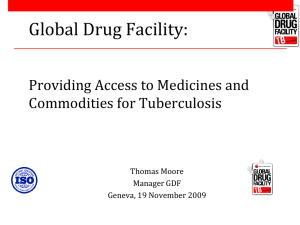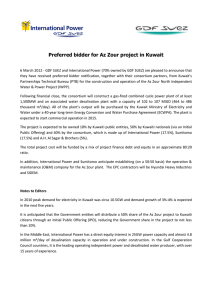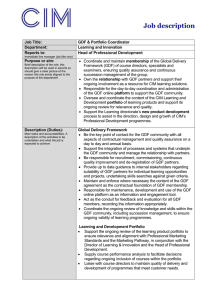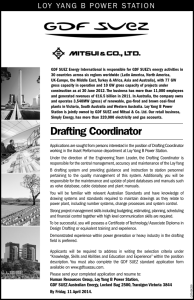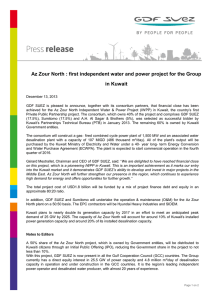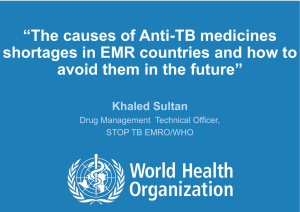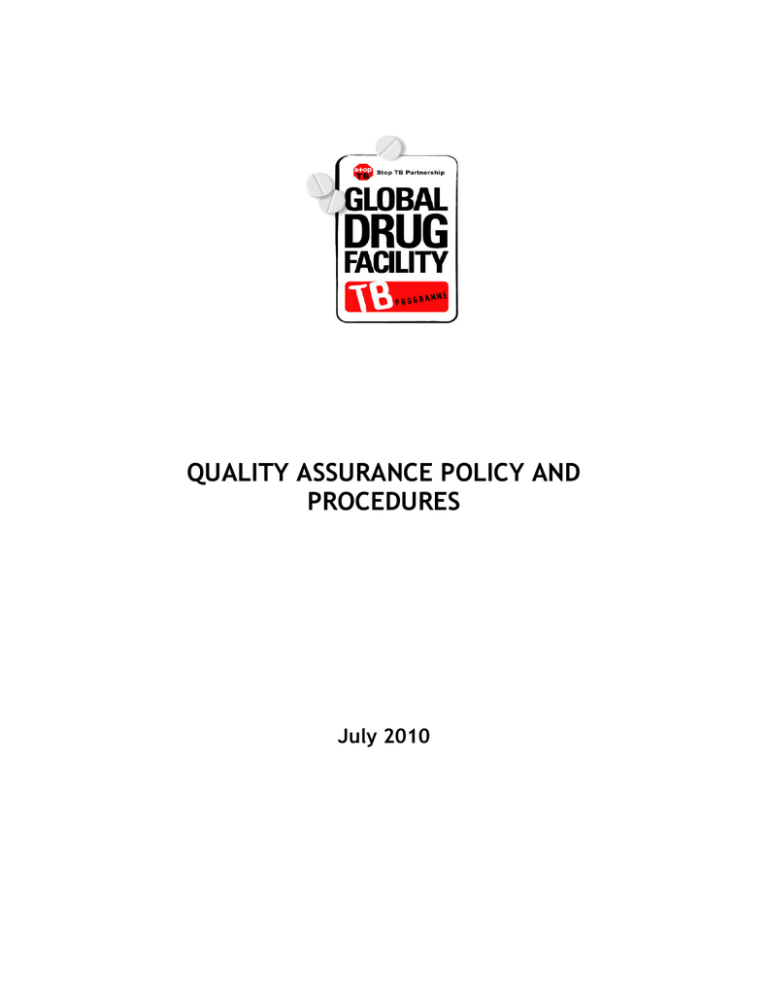
QUALITY ASSURANCE POLICY AND
PROCEDURES
July 2010
© World Health Organization 2010
All rights reserved.
The designations employed and the presentation of the material in this
publication do not imply the expression of any opinion whatsoever on the part
of the World Health Organization concerning the legal status of any country,
territory, city or area or of its authorities, or concerning the delimitation of its
frontiers or boundaries. Dotted lines on maps represent approximate border
lines for which there may not yet be full agreement.
The mention of specific companies or of certain manufacturers’ products does
not imply that they are endorsed or recommended by the World Health
Organization in preference to others of a similar nature that are not
mentioned. Errors and omissions excepted, the names of proprietary products
are distinguished by initial capital letters.
All reasonable precautions have been taken by the World Health Organization
to verify the information contained in this publication. However, the published
material is being distributed without warranty of any kind, either express or
implied. The responsibility for the interpretation and use of the material lies
with the reader. In no event shall the World Health Organization be liable for
damages arising from its use.
Global TB Drug Facility / Stop TB Partnership
World Health Organization, 20 avenue Appia, CH-1211 Geneva 27, Switzerland
Fax: + 41-22-791 4486 or + 41-22-791 4886
Email: gdf@stoptb.org ⋅ Website: www.stoptb.org/gdf
The Stop TB Partnership Secretariat is housed by the World Health Organization
1/17
Abbreviations
BP
DP
ERP
EU
FDA
FLD
FPP
GDF
GDP
GLC
GLI
GMP
GSP
ICH
INN
Pharm Int
ITB
LICB
MDR-TB
NGO
OOS
PA
PIC/s
PPQ
PQS
PSI
QA
QC
QCA
RfP
SLD
SRA
TA
TAG
TB
TPEC
USP
WHO
WHO EML
WHO MQAS
WHO PQP
WHO QSM
British Pharmacopoeia
Direct Procurement
Expert Review Panel
European Union
Food and Drug Administration
First Line Drugs
Finished Pharmaceutical Product
Global Drug Facility
Good Distribution Practices
Green Light Committee
Global Laboratory Initiative
Good Manufacturing Practices
Good Storing Practices
International Conference of Harmonization
International Non-proprietary Names
WHO International Pharmacopoeia
Invitation to Bid
Limited International Competitive Bid
Multi Drug Resistance TB
Non Governmental Organization
Out Of Specification
Procurement Agent
Pharmaceutical Inspection Cooperation Scheme
Product Pharmaceutical Questionnaire
Performance Quality and Safety
Pre-Shipment Inspection
Quality Assurance
Quality Control
Quality Control Agent
Request for Proposal
Second Line Drugs
Stringent Regulatory Authority
Technical Assistance
Technical Advisory Group
Tuberculosis
Technical Product Evaluation Committee
United States Pharmacopoeia
World Health Organization
World Health Organization Essential Medicines List
World Health Organization Model Quality Assurance System for
Procurement Agencies
World Health Organization Pre-Qualification Program
World Health Organization Quality System Management
Global TB Drug Facility / Stop TB Partnership
World Health Organization, 20 avenue Appia, CH-1211 Geneva 27, Switzerland
Fax: + 41-22-791 4486 or + 41-22-791 4886
Email: gdf@stoptb.org ⋅ Website: www.stoptb.org/gdf
The Stop TB Partnership Secretariat is housed by the World Health Organization
2/17
Index
1 Introduction ............................................................................................................. 4
1.1
Grant service..................................................................................................... 4
1.2
Direct procurement services.......................................................................... 5
1.3
Harmonization of the quality assurance policy and procedures with
other major international organizations and donors............................................. 5
2 List of products supplied by GDF.......................................................................... 6
3 Quality assurance policy ........................................................................................ 6
3.1
Policy statement .............................................................................................. 6
3.2
Responsibilities: product quality assurance personnel ............................. 6
3.3
Scope and quality assurance principles ....................................................... 7
3.4
Conflict of interest .......................................................................................... 7
3.5
Confidentiality commitment.......................................................................... 7
4 Quality assurance standards ................................................................................. 8
5 Quality assurance for medicines .......................................................................... 8
5.1
Quality criteria for acceptance of product-manufacturing site.............. 8
5.2
Quality and clinical risk assessment process............................................. 10
5.3
Variations......................................................................................................... 11
5.4
Product selection for supply ........................................................................ 12
6 Quality assurance related to the selection and assessment of services
contracted by GDF: procurement agents and quality control agents ............... 12
7 Drug quality control and post- delivery surveillance...................................... 14
7.1
Pre-delivery quality monitoring .................................................................. 14
7.2
Post delivery - surveillance .......................................................................... 15
8 Other countries with national pharmaceutical production of anti-TB
medicines...................................................................................................................... 16
9 Quality assurance and diagnostics technologies ............................................. 17
10 Quality assurance for medical devices.............................................................. 17
11 Ad hoc expert committees .................................................................................. 17
12 Revision of this policy and procedures.............................................................. 17
Global TB Drug Facility / Stop TB Partnership
World Health Organization, 20 avenue Appia, CH-1211 Geneva 27, Switzerland
Fax: + 41-22-791 4486 or + 41-22-791 4886
Email: gdf@stoptb.org ⋅ Website: www.stoptb.org/gdf
The Stop TB Partnership Secretariat is housed by the World Health Organization
3/17
Introduction
1
The Global Drug Facility (GDF) is an initiative of the Stop TB Partnership to increase
access to quality-assured tuberculosis (TB) medicines in line with the STOP TB Strategy.
GDF is housed at the World Health Organization (WHO) headquarters in Geneva and
managed by a team in the Stop TB partnership secretariat. It was launched in 2001.
For more information, refer to: http://www.stoptb.org/stop_tb_initiative/
GDF, in partnership with contractual and collaborative agencies, offers three core
services:
1.1
•
Grant Service (first and second line anti-TB medicines, new diagnostics) for
countries that are donor-dependent for some or all of their drug supply,
•
Direct Procurement (DP) Service for countries, NGOs and donors wanting to
buy first line anti-TB medicines and diagnostic equipment, or second line
anti-TB medicines for Green Light Committee (GLC) approved projects,
•
Technical Assistance (TA) Service for Grant and DP recipients (first and
second line anti-TB medicines) through annual and ad hoc missions for incountry drug management monitoring and training.
Grant service
GDF grant service is a mechanism whereby adult and paediatric first-line anti-TB
medicines are granted to approved countries to support STOP TB strategy expansion
and sustainability of nationwide coverage in countries that do not have sufficient
finances for their medicine needs and who lack adequate procurement capacity,
including a robust quality assurance system.
GDF also offers emergency grants of one year to prevent stock outs due to factors such
as insufficient funding, procurement delays, natural disasters and humanitarian crises.
GDF applies a holistic approach to TB drug procurement, by linking demand for
medicines to supply and monitoring, outsourcing all services to partners on a
competitive basis, using product packaging to simplify drug management and linking
grants to TB programme performance.
GDF is also the procurement arm of the GLC initiative, for more information please
refer to: http://www.who.int/tb/challenges/mdr/greenlightcommittee/en/
Established in 2000, the GLC initiative is the mechanism that enables access to
affordable, quality, second line anti-TB medicines for the treatment of multi-drug
resistant-TB (MDR-TB). It ensures that programmes are technically sounded so that
multilateral e.g. Global Fund and UNITAID and bilateral donor agencies can continue
to disburse funds for MDR-TB treatment.
Global TB Drug Facility / Stop TB Partnership
World Health Organization, 20 avenue Appia, CH-1211 Geneva 27, Switzerland
Fax: + 41-22-791 4486 or + 41-22-791 4886
Email: gdf@stoptb.org ⋅ Website: www.stoptb.org/gdf
The Stop TB Partnership Secretariat is housed by the World Health Organization
4/17
1.2
Direct procurement services
GDF DP service enables clients to use their own resources to procure quality-assured
anti-TB medicines, diagnostics equipment, and medical supplies, through a reliable
procurement agent, at prices that result in savings.
The DP service provides eligible countries and organizations which are committed to
the STOP TB strategy, but who lack adequate procurement capacity, including a robust
quality assurance system, with access to affordable, quality-assured anti-TB
commodities and expert technical assistance to promote the effective and sustainable
control of TB.
1.3
Harmonization of the quality assurance policy and procedures with
other major international organizations and donors
In 2008, GDF initiated a revision and expansion of its Quality Assurance Policy and
Procedures as part of a collaborative process to ensure harmonization with the policies
of two major multi-lateral financing mechanisms (i.e. The Global Fund and UNITAID),
and other organizations (i.e. The Union; UNICEF, Médecins Sans Frontières) involved in
TB control and in particular to:
- ensure global consistency on quality standards set for procurement and supply of
anti-TB medicines, medical as well as diagnostics items
- avoid duplication of effort.
Meanwhile, GDF continues to contribute, in an ongoing manner, to discussions with
other key technical partners and donors (e.g. as part of the Inter-agency
Pharmaceutical Coordination group -IPC-) on:
•
•
•
exchanging information on anti-TB medicines, diagnostics and suppliers;
sharing information on quality aspects of medicines and diagnostics and
medical devices ;
developing common tools and mechanisms.
For further information on GDF's services and operations, please refer to:
http://www.stoptb.org/gdf/.
Global TB Drug Facility / Stop TB Partnership
World Health Organization, 20 avenue Appia, CH-1211 Geneva 27, Switzerland
Fax: + 41-22-791 4486 or + 41-22-791 4886
Email: gdf@stoptb.org ⋅ Website: www.stoptb.org/gdf
The Stop TB Partnership Secretariat is housed by the World Health Organization
5/17
List of products supplied by GDF1
2
•
•
•
•
•
•
•
3
3.1
First-line adult and paediatric anti-TB medicines as listed in the current WHO
Essential Medicines List (WHO EML) and treatment guidelines
Anti-TB medicines to treat MDR-TB including second line and third line
medicines recommended by WHO and GLC and part of the current WHO EML
and/or recommended in MDR-TB guidelines
Water for injection
Patient kits (standard patient kits for different treatment categories)
Material and reagents necessary for diagnosis of susceptible TB
Rapid diagnostic tools for MDR-TB
Medical devices: syringes with needles
Quality assurance policy
Policy statement
GDF attaches significant importance to the quality of the products that are supplied to
countries to diagnose and treat TB. Through its procurement, technical assistance and
monitoring services GDF plays a key role in supporting countries in need to reliably
access affordable essential TB medicines and diagnostic tools meeting adequate and
globally accepted quality standards.
3.2
Responsibilities: product quality assurance personnel
The qualification of health products and manufacturers for procurement and supply,
the monitoring of their quality and their periodic requalification are essential parts of
GDF's quality assurance system.
Within GDF, the QA personnel, who work independently but in collaboration with all
other sub-teams, are responsible for the definition of the QA policy and procedures
and for ensuring their satisfactory implementation all along the procurement and
supply chain.
1
The list shall be updated as new products are incorporated to the portfolio of products supplied by GDF
Global TB Drug Facility / Stop TB Partnership
World Health Organization, 20 avenue Appia, CH-1211 Geneva 27, Switzerland
Fax: + 41-22-791 4486 or + 41-22-791 4886
Email: gdf@stoptb.org ⋅ Website: www.stoptb.org/gdf
The Stop TB Partnership Secretariat is housed by the World Health Organization
6/17
3.3
Scope and quality assurance principles
With the mission of ensuring the safety, efficacy and quality of products provided by
GDF, the quality assurance system is based on:
3.4
•
the WHO/Stop TB Strategy;
•
authorization for importation and use by recipient countries;
•
recommendations by the relevant WHO Programmes i.e. Prequalification of
Medicines Programme (PQP); Prequalification of Diagnostics Programme and
Essential Health Technologies Performance;
•
authorization for marketing by a stringent national medicines regulatory
authority (SRA) in the country;
•
procurement and term-limited supply of products based on the
recommendations and quality/clinical risk assessments of an independent
Expert Review Panel comprising experts, where there are insufficient WHO
prequalified or SRA approved products available2;
•
monitoring programme of the quality of supplied products including
independent random quality control testing and post-delivery surveillance.
Conflict of interest
All personnel involved in the qualification and procurement of products must not
represent any real, potential or apparent conflict of interest3.
3.5
Confidentiality commitment
All the information related to source qualification of the products submitted to GDF is
considered confidential. Therefore, in line with the need for harmonization of quality
policies and qualification processes, exchanges of information on products and
suppliers between GDF and key partners will be governed by signed confidentiality
agreements and, where required, authorizations from the proprietors of the
information.
GDF has created and maintains a product database which contains all the information
related to product quality, efficacy and safety. This database is managed by the GDF
quality assurance personnel. Non-confidential product information such as the
characteristics of medicines to be supplied will be available to interested parties i.e.
eligible countries, technical partners and procurement agents.
2
3
Refer to section 5.4 for definition
To confirm this, persons will be asked to sign a WHO "Declaration of Interest"
Global TB Drug Facility / Stop TB Partnership
World Health Organization, 20 avenue Appia, CH-1211 Geneva 27, Switzerland
Fax: + 41-22-791 4486 or + 41-22-791 4886
Email: gdf@stoptb.org ⋅ Website: www.stoptb.org/gdf
The Stop TB Partnership Secretariat is housed by the World Health Organization
7/17
4
Quality assurance standards
GDF bases its QA system for supplied products on quality standards and referential
norms set by WHO:
•
•
•
•
•
•
•
•
WHO Model Quality Assurance System for Procurement Agencies (WHO
MQAS);
WHO Good Manufacturing Practices (GMP);
WHO Good Distribution Practices (GDP), including Good Storage Practices
(GSP);
WHO technical report series;
Monographs set by WHO International Pharmacopeia (Pharm Int), United
States Pharmacopoeia (USP), British Pharmacopeia (BP) and European
Pharmacopeia (EP);
WHO Essential Medicines and Pharmaceutical Policies;
WHO Essential Health Technologies;
Global Laboratory Initiative (GLI).
Quality assurance for medicines4
5
5.1
Quality criteria for acceptance of product-manufacturing site
To be eligible for GDF procurement and supply, any medicine and its manufacturing
site must comply with GDF QA criteria established as follows:
all finished pharmaceutical products (FPP) need to be authorized by the
relevant national medicines regulatory authority in the country of use.
in addition, all FPP products must meet the following criteria :
A) Products are pre-qualified by WHO under the WHO PQP; OR
B) Products are approved by a SRA defined as either: an ICH5 member country,
an ICH observer or any country whose regulatory authority is associated with an
ICH member through a legally binding mutual recognition agreement, or be
4
Medicines cover all anti-TB medicines and water for injection supplied by GDF.
International Conference on Harmonization of Technical Requirements for the Registration of
Pharmaceuticals for Human Use: www.ich.org (a) a member of the ICH (as specified on its website,
www.ich.org); or (b) an ICH Observer, being the European Free Trade Association (EFTA) as represented
by Swiss Medic, Health Canada and the World Health Organization (WHO) (as may be updated from time
to time); or (c) a regulatory authority associated with an ICH member through a legally binding mutual
recognition agreement including Australia, Norway, Iceland and Liechtenstein (as may be updated from
time to time).
For new members of the European Union (EU), only pharmaceutical products which were delivered a
market authorization after EU integration are considered as approved by a SRA. GDF will consult with
relevant WHO/QSM experts on the progress of such countries in adjusting their pharmaceutical legislation
to EU laws before recognizing the approval by the national health authorities.
5
Global TB Drug Facility / Stop TB Partnership
World Health Organization, 20 avenue Appia, CH-1211 Geneva 27, Switzerland
Fax: + 41-22-791 4486 or + 41-22-791 4886
Email: gdf@stoptb.org ⋅ Website: www.stoptb.org/gdf
The Stop TB Partnership Secretariat is housed by the World Health Organization
8/17
approved or subject to a positive opinion under the Canada S.C. 2004, c. 23
(Bill C-9) procedure, or Art. 58 of European Union Regulation (EC9 No.
726/2004) or United States FDA tentative approval.
In the absence of available6 products meeting the standards A) and/or B) above,
products may be approved for procurement by GDF under the following option:
C) Products shall be found acceptable to GDF for procurement through a
quality/clinical risk assessment process (refer to section 5.2) managed by an
independent Expert Review Panel. Products shall be eligible for this interim
process under the following conditions:
1) The FPP must be manufactured at an approved site as follows:
•
the site must have been inspected by WHO as a part of the WHO PQP
(refer to http://apps.who.int/prequal/) and found to be operating
at an acceptable level of compliance with WHO GMP for the specific
type of product7; OR
•
the site must have been inspected and found acceptable for the
manufacture of the specific type of product by a SRA defined as
either: an ICH member country, an ICH observer or any country
whose regulatory authority is associated with an ICH member
through a legally binding mutual recognition agreement; OR
•
the site must have been inspected and found acceptable for the
manufacture of the specific product8 by inspectors of a regulatory
authority participating in the Pharmaceutical Inspection Cooperation
Scheme (PIC/S)6 .
2) A product prequalification or approval as described respectively under
either points ”A)” or “B)” is pending, i.e. manufacturers have submitted
relevant product dossiers and the dossiers have been accepted for
assessment either by WHO PQP or a SRA9.
6
Refer to section 5.4 for definition
Requirement fulfilled as long as the scope of the audit covers the specific dosage form as confirmed by
the either WHO PQP, SRA or ERP experts
8
Pharmaceutical Inspection Cooperation Scheme: http://www.picscheme.org/. For any new PIC/S
members, GDF will consult with relevant WHO/QSM experts on the level of equivalence of the GMP
inspection with those of old members PIC/s countries.
9
A written proof of such submission and acceptance issued by WHO PQP or the relevant authority will be
required.
7
Global TB Drug Facility / Stop TB Partnership
World Health Organization, 20 avenue Appia, CH-1211 Geneva 27, Switzerland
Fax: + 41-22-791 4486 or + 41-22-791 4886
Email: gdf@stoptb.org ⋅ Website: www.stoptb.org/gdf
The Stop TB Partnership Secretariat is housed by the World Health Organization
9/17
3) Eligibility under point C) shall be limited to a maximum duration of 12 months
from the time of the ERP recommendation, during which time manufacturers
should obtain prequalification by WHO PQP or approval by a SRA10.
Note: Products approved for procurement under C) should not be considered as
quality-assured to the same extent as if prequalified by WHO or approved by a SRA.
For this reason they should only be procured if products approved for procurement
under A) or B) are not available.11
5.2 Quality and clinical risk assessment process
In order to ensure continuous supply of adequate quality-assured medicines and costeffective procurement services, when there are less than three finished
pharmaceutical products (FPP) available 12 that are prequalified by the WHO
Prequalification Programme and/or authorized by a SRA, GDF QA will publish an
Expression of Interest (EoI) for both product and manufacturing site evaluations on the
basis of a quality and clinical risk assessment for procurement purposes. Such EoIs will,
to the extent possible, be published in collaboration with the Global Fund and other
partners in the interests of harmonization and non-duplication of effort.
Quality and clinical risk assessments are carried out for products that are not
prequalified by WHO PQP and/or authorized by SRAs for procurement purposes.
Such assessments are conducted by an Expert Review Panel (ERP). The ERP is an
independent group of highly qualified regulatory experts identified and convened by
the WHO Department of Essential Medicines and Pharmaceutical Policies and is derived
from an existing pool of experts with a wide range of expertise in the pharmaceutical
and medical fields.
After conducting comparative quality and clinical risk assessment reviews of submitted
applications (based on the status of the quality, efficacy and safety of the products),
the ERP comes up with an objection or no-objection conclusion as to the potential
acceptability for procurement for a term-limited period (12 months). The FPPs must
also meet the following eligibility criteria:
a) the manufacturer of the FPP has submitted an application to the WHO PQP and
has been accepted for assessment OR an application for marketing
authorization to a SRA and has been accepted for assessment;
b) the FPP is manufactured at a site that is compliant with the standards of GMP
applicable to the FPP in question as verified after inspection by:
1) WHO PQP inspectors or 2) SRA inspectors or 3) A regulatory authority participating
to the Pharmaceutical Inspection Cooperation Scheme (PIC/s).
10
However, GDF may, in its sole discretion, request the ERP to consider extending the ERP
recommendation period for up to an additional 12 months if the FPP is not yet WHO-prequalified or SRAauthorized within the ERP Recommendation Period.
11
Refer to section 5.4 for definition
12
Refer to section 5.4 for definition
Global TB Drug Facility / Stop TB Partnership
World Health Organization, 20 avenue Appia, CH-1211 Geneva 27, Switzerland
Fax: + 41-22-791 4486 or + 41-22-791 4886
Email: gdf@stoptb.org ⋅ Website: www.stoptb.org/gdf
The Stop TB Partnership Secretariat is housed by the World Health Organization
10/17
The following generic steps outline the EoI process for products and manufacturing
site evaluations13:
1. GDF in collaboration with the relevant partners will establish the conditions,
requirements, Pharmaceutical Product Questionnaire and the list of products to
be included in the EoI
2. Publication of the EoI for selected anti-TB medicines (i.e. anti-TB medicines for
which there are less than three FPP prequalified by WHO PQP and/or
authorized by a SRA available in the market) with all the specifications and
requirements
3. Submission of the dossiers by the manufacturers to the address indicated in the
EoI
4. Opening and registration of submissions14
5. Screening the completeness of the submission according to the EoI
requirements.
6. If dossiers submitted are complete and in compliance with the EoI
requirements, they are sent to the ERP coordinator for assessment
7. ERP reviews the dossiers
8. ERP reports to the GDF and other relevant partners
9. GDF and other relevant partners send letters to the manufacturers
communicating the dossier assessment conclusions.
10. Based on ERP recommendations, all FPPs eligible for procurement (within the
validity period) are published and/or used as the basis for supply.
5.3
Variations
For A) or B) products, any variation related to the manufacturer and/or product and
submitted to WHO PQP or SRA must be notified by the supplier to GDF. GDF will rely
on the assessment of such variations by WHO PQP and/or a SRA.
For products found acceptable through the quality/clinical risks assessment process
(ERP process), no variation will be accepted since these products are expected to have
successfully completed the approval process either through the WHO PQP or through a
SRA before the end of the validity period of 12 months.
13
An SOP developed by GDF and relevant partners defines entire process with actions, responsibilities and
timelines.
14
The opening, registration and screening of dossiers submitted and communication to manufacturers
will be carried out by the assigned staff from the Quality Assurance teams of GDF and relevant partners
Global TB Drug Facility / Stop TB Partnership
World Health Organization, 20 avenue Appia, CH-1211 Geneva 27, Switzerland
Fax: + 41-22-791 4486 or + 41-22-791 4886
Email: gdf@stoptb.org ⋅ Website: www.stoptb.org/gdf
The Stop TB Partnership Secretariat is housed by the World Health Organization
11/17
5.4
Product selection for supply
Scenario 1
If there are two, or more than two A) and/or B) products and sources 15 available* for
a given FPP then GDF will only select manufacturers of the A) and/or B) products for
procurement based on a Limited International Competitive Bid (LICB).
Scenario 2
If there are less than two A) and/or B) products and sources available,* any ERP
eligible source of the product(s) may be selected for supply based on GDF's LICB or
other relevant selection process.
When it comes to market share allocation, eligible A) and/or B)
products/manufacturing sites will be prioritized over ERP eligible products through a
rating system16 to be applied during the tender process.
A positive recommendation for procurement and supply of an FPP by the ERP is valid
for 12 months.
*Please note that in both cases, “available” means the manufacturer can supply the
requested quantity of the FPP within 90 days of the requested delivery date.
6
Quality assurance related to the selection and
assessment of services contracted by GDF: procurement
agents and quality control agents
GDF contracts out services through competitive processes for specific time durations.
The quality assurance personnel are responsible for establishing and evaluating all
product quality-related requirements, conditions and accreditations for the respective
services, which are included in the Request for Proposal (RfP).
The activities of procurement agents (PAs) - on behalf of GDF - are related to the
contracting of manufacturers through Limited International Competitive Bids (LICBs)17
and supplying and delivering of GDF selected products.
In all those activities the PAs will follow GDF's QA Policy and Procedures. The PAs are
responsible for the coordination of the pre-shipment inspection (PSI), sampling and
15
A product is defined as per its INN, strength, form, type of packaging (HPDE container or Alu/PvC foil
blister or Alu/Alu foil strips)
16
Rating system: In an LICB where a product from a PQP/SRA authorized source and the same product
from an ERP recommended source are eligible for supply, the rating system will accord a competitive
advantage to the former. Note: Other factors such as registration of the product in the recipient country,
price and delivery time will also determine the selection and market share/orders allocation of the
products/manufacturers for supply.
17
Only qualified product-manufacturers
Global TB Drug Facility / Stop TB Partnership
World Health Organization, 20 avenue Appia, CH-1211 Geneva 27, Switzerland
Fax: + 41-22-791 4486 or + 41-22-791 4886
Email: gdf@stoptb.org ⋅ Website: www.stoptb.org/gdf
The Stop TB Partnership Secretariat is housed by the World Health Organization
12/17
quality control testing activities involving the qualified manufacturers and Quality
Control Agents (QCA) by GDF following GDF's Standard Operating Procedures (SOP).
GDF is entitled to conduct pre-award audits18 of PAs which respond to an RfP before a
final award contract is issued. The scope of such audits includes but is not limited to:
•
checking compliance to WHO Good Distribution Practices and Good Storing
Practices;
•
assessing whether the internal QA system at the PA is compliant with the WHO
Model Quality Assurance System for Procurement Agencies for the activities run
on behalf of GDF; specific attention will be given to the batch-tracking system
and recall procedures;
Within its QA system, PAs should have a written procedure on how to recall promptly
and effectively any delivered product known or suspected to be defective, with a
designated person(s) responsible.
A recall could be initiated on the basis of GDF internal quality control monitoring, one
of GDF beneficiary countries, a manufacturer and/or marketing authorization holder,
or a PA itself. In any case, communication has to be set between GDF and the
concerned PA as soon as one party is informed of a quality alert linked to a medicine
or other medical item supplied by GDF. The PA will work with the product supplier to
carry out appropriate recall procedures including the following:
•
•
•
•
•
tracking the concerned product (quantity in stock and delivered per
destination);
informing the manufacturer or/and marketing holder where a recall is
instituted by an entity other than the manufacturer;
informing promptly all customers and competent authorities of all countries to
which the pharmaceutical product which is suspected defective may have been
distributed;
carrying out the recall, storing the goods in a secure and segregated area if not
being done by the supplier;
handling records of the recall and issuing a final report including reconciliation
between delivered and recovered quantities of products.
GDF shall provide support all along the recall process with data available in the GDF
order management system (“OMS” database) and counter-check the final PA recall
report.
The effectiveness of the arrangements made for recalls should be evaluated at regular
intervals. Required improvements should lead to an update of related procedures at
GDF and PA levels.
For medicines and other medical items supplied directly by GDF but not through GDF's
PA, GDF will be responsible for carrying out all recall required activities, as described
in GDF’s recall procedure.
18
By GDF QA pharmacist and/or appointed experts
Global TB Drug Facility / Stop TB Partnership
World Health Organization, 20 avenue Appia, CH-1211 Geneva 27, Switzerland
Fax: + 41-22-791 4486 or + 41-22-791 4886
Email: gdf@stoptb.org ⋅ Website: www.stoptb.org/gdf
The Stop TB Partnership Secretariat is housed by the World Health Organization
13/17
From March 2009, GDF has been part of the Global Fund (and associated partners’)
Quality Control Initiative, using the same consignment inspection, sampling and testing
capabilities and publishing jointly Request for Proposals for the selection of the
common Quality Control Agents aimed at:
Harmonization of activities
Standardization of process and procedures
Cost efficiency through the pooling of activities and sharing of results
Transparency and competition
•
•
•
•
GDF QA personnel, to the extent possible, will continue participating with key partners
such as Global Fund and others in the selection of QCA for anti-TB medicines and
product monitoring activities.
7
Drug quality control and post- delivery surveillance
Quality control is an essential part of the QA system under the responsibility of the QA
team.
GDF engages the services of QCAs based on the Quality Control Initiative described in
Section 6 above
Selected QCAs must have valid international and national certifications as follows:
7.1
Prequalification letter issued by WHO; and ISO 17025 certified by an
international recognized accreditation company
Good Laboratory Practices assessment letter issued by a SRA and ISO 17025
certified by an international recognized accreditation company
Good Laboratory Practices issued by the national health authorities
Pre-delivery quality monitoring19
- For WHO prequalified/SRA authorized products:
•
•
19
A Pre-shipment inspection is organized either by the beneficiary country
and/or by GDF through the selected QCA.
Sampling and testing are done according to a batch randomization testing
plan either by the beneficiary country and/or by GDF through its selected
QCA.
Refer to the latest GDF monitoring programme activities for detailed information
Global TB Drug Facility / Stop TB Partnership
World Health Organization, 20 avenue Appia, CH-1211 Geneva 27, Switzerland
Fax: + 41-22-791 4486 or + 41-22-791 4886
Email: gdf@stoptb.org ⋅ Website: www.stoptb.org/gdf
The Stop TB Partnership Secretariat is housed by the World Health Organization
14/17
- For products selected through the ERP process:
•
•
•
A PSI is organized by GDF through its selected QCA
Sampling of all purchased/selected batches according to a randomization
plan are collected and tested by the GDF selected QCA
Procurement of the respective batches proceeds only after full compliance
to specifications20, on the basis of a certificate of analysis provided by QCA
to GDF and beneficiary countries.
For a product supplied to a country receiving financial support from a financial donor
as the Global Fund, GDF coordinates the monitoring activities with such funding
institution in order to avoid duplication of PSI and quality control testing.
In cases of non compliance, either in the quality of a product or other defects such as
the packaging, the manufacturer will be requested to replace the complete batch at
its own cost.
In cases of non compliant testing results, i.e. confirmed out of specifications (OOS) by
GDF's independent QCA laboratory, GDF will send a complaint to the manufacturer
with the following provisions21:
•
In the event that the manufacturer provides within a week a complaint
investigation report which is found acceptable by GDF, the latter will have the
same sample retested by its QCA
•
If the complaint investigation report is not provided or found not acceptable to
GDF, the latter will recognize the OOS result by its QCA which will issue the
final Certificate of Analysis with the OOS test results
An OOS investigation must not delay order arrival to the country’s TB programme. GDF
will ask the manufacturer to replace the batch at its own cost in order to service the
countries needs.
7.2
Post delivery - surveillance
Drug monitoring activities can also be organized post delivery by GDF or can be based
on beneficiary countries' drug monitoring programmes. Some countries conduct
systematic laboratory testing once medicines are received by customs and while
medicines are in quarantine.
GDF is willing to participate in drug surveys in collaboration with NRA, WHO/Quality
and Safety of Medicine staff and/or other GDF partners.
20
Recognized pharmacopoeias method specifications and/or recognized manufacturer's method
specifications for the specific product.
21
Refer to the latest version of the SOP for Out of Specifications
Global TB Drug Facility / Stop TB Partnership
World Health Organization, 20 avenue Appia, CH-1211 Geneva 27, Switzerland
Fax: + 41-22-791 4486 or + 41-22-791 4886
Email: gdf@stoptb.org ⋅ Website: www.stoptb.org/gdf
The Stop TB Partnership Secretariat is housed by the World Health Organization
15/17
Complaint handling
Any recipient country can report a complaint to GDF. Complaints are managed as per
GDF complaint procedures.
Two reporting systems exist at GDF to deal with customer complaints. The customer
can fill out a complaint form (available on GDF website). GDF also supports Customer
Satisfaction Surveys on a regular basis to ensure that all clients are satisfied with its
performance.
All complaints concerning potentially defective FPPs are reviewed carefully by GDF
quality assurance staff and the quality systems manager so that appropriate actions
can be taken including potential recall. Customer complaints received via other
channels and negative reviews on returned surveys are duly investigated by GDF and
its PA.
Additionally, WHO PQP inspectors, during inspection and monitoring visits, will verify
if the batches purchased by GDF have been manufactured at the accepted sites and
comply with the characteristics and specifications approved.
8
Other countries with national pharmaceutical production
of anti-TB medicines
Since some national TB treatment protocols differ from the WHO TB treatment
protocols, WHO prequalified or SRA approved products may not be available for supply
to these respective countries. However, the quality/clinical risk assessment process
will still apply for these medicines.
For anti-TB products produced and used solely in specific countries, pursuant to the
explicit recommendation of the relevant unit in the WHO Stop TB Department, and
subject to the agreement of the ERP Coordinator, GDF applies the following eligibility
criteria and requirements for being accepted for ERP review:
1. These Formulations are included in the WHO Model List of Essential Medicines
and/or in the WHO standard treatment guidelines or in National/institutional
Guidelines.
2. The product is manufactured at a site that is compliant with all standards of
Good Manufacturing Practice that apply to the relevant product formulation, as
verified after inspection by the WHO Prequalification Programme OR an SRA OR
a regulatory authority participating to the Pharmaceutical Inspection
Cooperation Scheme.
Global TB Drug Facility / Stop TB Partnership
World Health Organization, 20 avenue Appia, CH-1211 Geneva 27, Switzerland
Fax: + 41-22-791 4486 or + 41-22-791 4886
Email: gdf@stoptb.org ⋅ Website: www.stoptb.org/gdf
The Stop TB Partnership Secretariat is housed by the World Health Organization
16/17
9
Quality assurance and diagnostics technologies
GDF bases its QA system for supplied diagnostics on quality standards and referential
norms
set
by
WHO
Global
Laboratory
Initiative
(GLI)
http://www.stoptb.org/wg/gli/default.asp, WHO Prequalification of Diagnostics
Programme http://www.who.int/diagnostics_laboratory/evaluations/en/, Essential
Health Technologies Department http://www.who.int/eht/en/.
GDF QA staff will work in close collaboration with the all relevant partners such as
Global Fund, UNITAID and others in harmonizing the policies, standards, qualification
of sources and monitoring processes.
GDF together with the WHO Prequalification team for diagnostics, GLI and partners
will develop a mechanism for monitoring and evaluation of implementation of the
quality assurance policy regarding diagnostics.
10
Quality assurance for medical devices
GDF bases its QA system for the medical therapeutic injectable devices on the quality
standards and referential norms set by WHO Essential Health Technologies (e.g., the
Performance, Quality and Safety Project. Please refer to
http://www.who.int/immunization_standards/vaccine_quality/pqs_prequalified_devic
es_e13/en/index.html).
GDF QA team will work in close collaboration with all relevant partners such as Global
Fund, UNITAID and others in harmonizing the policies, standards, qualification of
sources and monitoring processes.
11
Ad hoc expert committees
GDF Quality Assurance personnel may convene additional advisory groups or expert
committees for specific tasks related to the assessment and qualification of products
for procurement and supply22.
12
Revision of this policy and procedures
This policy supersedes all previous policies and will be revised periodically as needed
Geneva, July 2010
22
The Technical Product Evaluation Committee (TPEC), formed early in 2009, assists GDF on Quality
Assurance (QA) matters related to specific needs for the procurement and supply of second-line anti-TB
drugs when the number of sources selected through established selection process are not sufficient to
meet the demand of programmes.
Global TB Drug Facility / Stop TB Partnership
World Health Organization, 20 avenue Appia, CH-1211 Geneva 27, Switzerland
Fax: + 41-22-791 4486 or + 41-22-791 4886
Email: gdf@stoptb.org ⋅ Website: www.stoptb.org/gdf
The Stop TB Partnership Secretariat is housed by the World Health Organization
17/17

